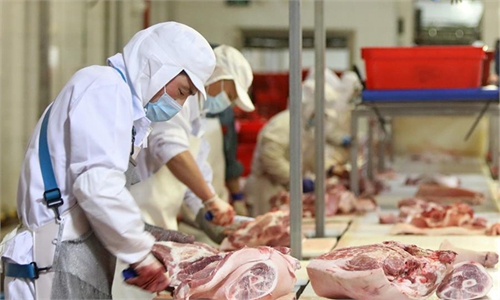Big data supports China's COVID-19 fight with tracking, resource allocation, treatment

A COVID-19 nucleic acid testing vehicle of BGI's MGI Tech Co is showcased at the China International Big Data Industry Expo 2021 in Guiyang, Southwest China's Guizhou Province on Thursday. Photo: Chi Jingyi/GT
China is one of the countries that has recovered from the COVID-19 crisis thanks to effective prevention and control measures, with big data playing an important role in early warning, contact tracking, resource allocation, medical treatment and other aspects, experts said during the China International Big Data Industry Expo 2021.
Like other international events held in China this year, participants were asked to provide a "green health code" or a green telecommunication data-based travel itinerary card, to enter the venues in Guiyang, Southwest China's Guizhou Province, as a virus prevention measure.
China Communications Services Corp, known as China Comservice, built the travel itinerary card data platform. A manager of China Comservice, who declined to be identified, told the Global Times that data privacy can be fully guaranteed on the platform.
"We were asked to build the platform on January 30 last year and finished work within 40 days, with 7,954 servers, and 964 pieces of network equipment deployed," said the manager, adding that equipment providers include Huawei and New H3C Group.
The GSMA has taken the travel itinerary card as an example of the mobile industry's response to COVID-19.
"China has set an example for the world. The US, for example, has the ability to build such a platform. The only problem is that the US government is not willing to invest that much. In addition, integration and connectivity among different US states may be difficult," said the manager.
Big data also supported remote medical treatment and resource allocation in China.
"When the COVID-19 epidemic broke out in 2020, our hospital used ultrasonic robots and remote technology to carry out remote consultations with technology support such as 5G with hospitals in Wuhan," Xie Fang from the 301 Hospital, said on Wednesday.
An intelligent truck company told the Global Times on Thursday that it managed trucks that operated between East China's Wuxi and Central China's Wuhan last year to transfer medical resources to the city, which was hard hit by the virus. Trucks were equipped with positioning devices.
Ren Binzhi, laboratory section chief of the Shanxi Provincial Center for Disease Control and Prevention, said at the expo that based on the epidemic prevention and control experience of Huo-Yan Laboratory, "we used technologies such as 5G to solve the problem of large masses of sample information collection, monitoring and early warning."
Huo-Yan Laboratory was developed by Chinese enterprise and leading nucleic acid test kit maker BGI Group. It was operating more than 80 Huo-yan laboratories in about 30 countries and regions as of the end of 2020, and its COVID-19 testing products have covered more than 180 countries and regions worldwide, according to statistics from BGI sent to the Global Times on Thursday.
"We have not only sent advanced technology and equipment abroad, but also provided training and technical support to local laboratory staff. We hope that China's experience in prevention and control of the epidemic will help countries quickly build up their capacity in this regard," said BGI.
MGI Tech Co, a subsidiary of BGI, showcased a Nucleic Acid Testing Vehicle at the big data expo. The vehicle is the size of a normal tour bus, but equipped with testing machines, disinfecting equipment and data transmission systems.
"It can test as many as 20,000 reagents every day, if 10 samples are integrated in one tube for batch testing, with only four people needed, while the traditional method requires 30-40 people. The test results can be transferred to the local Centers for Disease Control and Prevention (CDCs) simultaneously," a manager of MGI Tech Co told the Global Times on Thursday.
The manager revealed that MGI has exported nucleic acid testing machines to countries including India and Latvia, and the company has been getting inquiries for the testing vehicle from all over the world.


